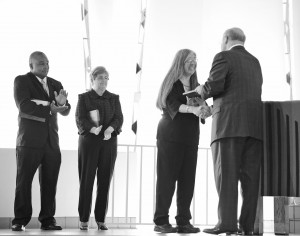
Last week, three Gustavus staff and faculty members were recognized for their extraordinary service to the Gustavus community. Staff member Judy Waldhauser, Director of Multicultural Programs Virgil Jones and Associate Professor of English Florence Amamoto were awarded the Augusta Carlson Schultz award, the Eric Norelius award and the Faculty Service award, respectively. These awards are given annually to Gustavus employees who have shown great dedication to the college and have gone above and beyond their duties to serve their fellow Gusties.
The Augusta Carlson Schultz award is named after a Gustie who began working in the Market Place as a teenager and continued to serve the college until her retirement. This year, Judy Waldhauser received the award for exceptional service and dedication to Gustavus Adolphus College.
“It’s just a very, very special thing to have been awarded,” Waldhauser said. “I’m honored, pleased, grateful and humbled.”
Waldhauser is proud to talk about her “tremendous” history and her family’s legacy at Gustavus, which includes almost every member of her and her husband’s immediate family. Waldhauser began her work here at Gustavus in the Audio Visual department (now Media Services) before spending nine years living on campus as a residence hall director for Sohre Hall. Since then she has worked as a computer coordinator in the Admissions Office, and 33 years later, she still enjoys her work here. “All the people who have passed through my life here—the students in the residence halls and the student workers—have really made it worthwhile,” she said.
Jones’ efforts in that department have garnered him the 2008 Eric Norelius award for Outstanding Administrator. “One of the unique things about this office is that it’s just me and an administrative assistant here, and we get done as much as we can,” said Jones. He describes his work in the Diversity Center as being “all about creating awareness on campus. Many people think that this office is just a way to represent minority students on campus, but that’s not the case. All students are welcome here.”
Jones has also worked with Gustie Greeter Groups, First Term Seminar classes and other student organizations to educate them about issues related to multicultural awareness, including “race, racism, urban education and privilege.” He has also been involved in the department’s off-campus outreach in working with local elementary schools that require bilingual translators to assist students who speak English as a second language.
“I’m excited and honored to receive this award, because I stand on the shoulders of so many other people. So by winning this award, it’s a tribute to them,” said Jones. “I’m proud to be a member of this community. I think it just shows that it’s not about who you are, it’s about what you’ve done and how much you love doing it.”
The recipient of the Faculty Service award, Amamoto, has been a major player in many initiatives and changes—especially those related to religion and diversity—that have shaped the Gustavus community into what it is today. Amamoto served as the director of Curriculum II for seven years at a time when the program was still young and going through its first external review. She was also one of three members of the 2002 Presidential Search Committee that selected James Peterson as the college’s 15th president, and she has served on numerous faculty and advisory boards throughout her Gustavus career. She was on the planning committee responsible for starting the Center for Vocational Reflection, and she is currently on the advisory board for that office.
“Gustavus is the college it is because of the faculty and staff that work here, always giving 110 percent,” said Amamoto. “I think there are many people here who deserve this award. One of the things I really like is the fact that there are three awards given out, because people all over campus work really hard to make this college a great and successful place. You don’t need to be a professor to teach; everybody here teaches in different ways, through different avenues.”